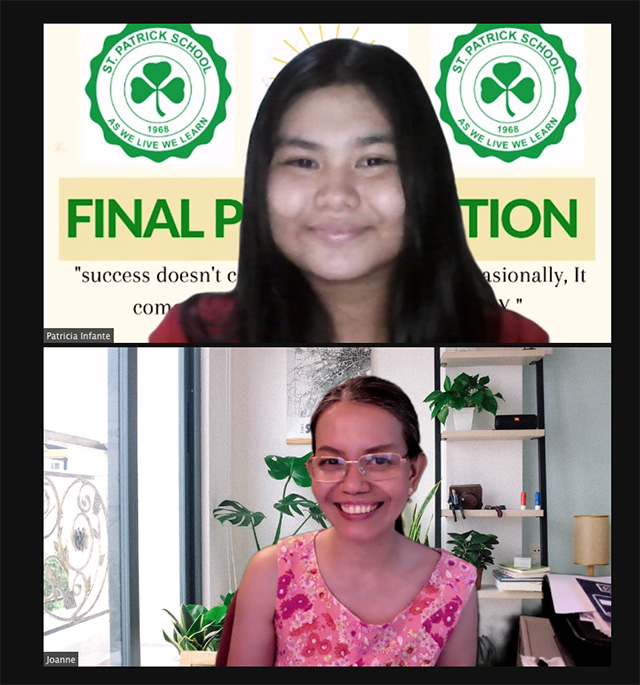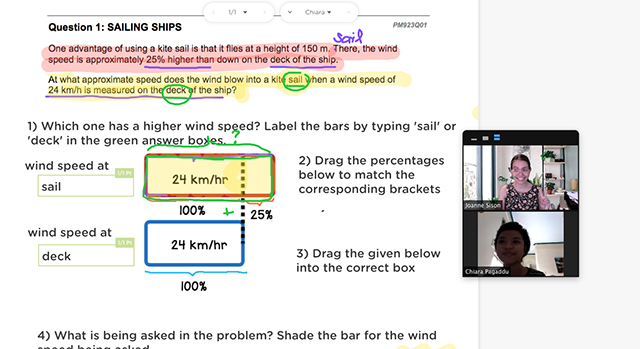-
When Joanne Sison learned that the Philippines ranked second to the last out of 79 countries in math in the 2018 Programme for International Student Assessment (PISA), she says it rocked her to the core. “I also felt partly responsible as a math teacher and I wondered, if I don’t do anything, then who else is crazy enough to try and solve this problem?”
Joanne has been an educator for 20 years now with specializations in math teaching and child development so she knew she had the foundation to be able to do something.
She dug deep into the problem, identifying that excellent math teachers were key to improving math skills of students in the country.
 Joanne conducts an activity for the alpha pilot design test of Mathayog with students who graduated from public schools in Grade 6..PHOTO BY Courtesy of Joanne Sison
Joanne conducts an activity for the alpha pilot design test of Mathayog with students who graduated from public schools in Grade 6..PHOTO BY Courtesy of Joanne Sison“A good math teacher should have vast content knowledge in Mathematics across grade levels, knows how to break down a problem into more straightforward tasks, gives exercises just in the zone of a child’s current understanding, and knows a child’s mindset,” she enumerates.
ADVERTISEMENT – CONTINUE READING BELOW“If students think that they cannot learn math, why should they bother?” she points out.
Replicating an excellent math teacher through Mathayog
While she says holding trainings for math teachers was a possible route to address the problem, it is not as scalable. Finding an answer to the question, “How can I replicate the qualities of an excellent math teacher and teach as many students as possible?” triggered her start-up called Mathayog.
“Mathayog means lofty, noble, or great. It’s a distinctly Filipino word that encapsulates our vision to develop Filipino students’ math skills and outcomes in K-12 Mathematics,” Joanne says.
Currently, Mathayog is being developed as an Artificial Intelligence (AI)-powered and adaptive learning K-12 platform. It focuses on developing students’ problem-solving skills based on the PISA’s unstructured-type questions.
“Open-ended questions are harder to teach in real life as well as in a computer program,” explains Joanne, “hence, Mathayog’s AI-machine learning algorithm is the future of education technology.”
 Mathayog focuses on developing students’ problem-solving skills based on the PISA’s unstructured-type questions.PHOTO BY Courtesy of Joanne SisonCONTINUE READING BELOWRecommended Videos
Mathayog focuses on developing students’ problem-solving skills based on the PISA’s unstructured-type questions.PHOTO BY Courtesy of Joanne SisonCONTINUE READING BELOWRecommended VideosIn designing the AI, Joanne and her team of math experts must be able to program crucial ‘decisions’ a good math teacher makes, into the computer, such as identifying the level a student is at and adjusting the teaching accordingly.
Say, a student has not memorized his multiplication table, then he cannot proceed solving a problem that involves the specific operation. However, the Mathayog AI is more nuanced than that.
In explaining growth mindset, she says one survey showed that 60% of Filipinos have a fixed mindset wherein they think that ‘to be good in math you have to be born with it.’ Addressing problems like this is where Mathayog hopes to revolutionize the teaching of math in the Philippine setting using AI.
“Math abilities are not inborn but a set of skills and ways of thinking that can be taught and learned over time, with the proper pedagogy, scaffolding, and approach,” she says.
Full and free support for six-months
To incubate her start-up, Joanne joined a program called “The Nursery” offered by the Miriam College-Technology Business Incubator (MC-TBI) which provides a whole ecosystem of support for start-ups, especially those that are women-led like Mathayog. MC-TBI is supported by a grant given by DOST-Philippine Council for Industry, Energy and Emerging Technology, Research and Development (DOST-PCIEERD).
“For six months, incubatees will get free and full support in facilitating the development of their start-up ventures in their early stages,” says MC-TBI Manager, Ma. Cristina Ibanez.
This support includes capacity-building activities, mentoring, networking events, providing potential seed funding, and conducting a series of trainings on business development and legalization as they transition their business ideas into a minimum viable product. The MC-TBI is housed under the Miriam College-Henry Sy, Sr. Innovation Center which provides the structure and tools incubatees may need. Since the pandemic, all capacity-building sessions were held online.
ADVERTISEMENT – CONTINUE READING BELOWJoanne says that through weekly talks, mentorship and ‘voluminous homework’ provided by MC-TBI, her start-up team was able to refine its ideas and business model, pin down the problem, and come up with a solution where they can make the most impact.
“We needed to understand what our customers are going to pay for, the value proposition, and where to find that sweet intersection between education and technology,” she says. She also says that it was during the incubation at MC-TBI where she met other women CEOs, “which leveled the playing field and provided a strong and nurturing support network.”
Once the AI programming is done and packaged, the Mathayog team hopes to target school-wide subscriptions, individual students and teachers. However, being essentially a social enterprise, their aim is to promote it among public schools.
Currently, the team is piloting Mathayog in four public schools in Quezon City. While they were able to get a grant from a BPO company, it is not enough, says Joanne.
“More funding will not only allow us to continue our product development and Beta testing with pilot public schools in NCR, but it is also a big morale booster,” she says. “It feels good to have established institutions believe in our vision of better math education for all Filipino students,” she concludes.
Got a start-up idea? Apply now
As MC-TBI opens its doors to a new batch of incubatees and technopreneurs with promising start-up ideas in areas like food, technology, education, well-being technology, among others, Joanne shares some “lessons learned” in the process of incubating her start-up:
ADVERTISEMENT – CONTINUE READING BELOW- A support network of institutions and individuals with a shared goal, such as improving the Philippine education landscape, is critical.
- There are many things to learn in setting up a start-up company and having a support system of female entrepreneurs can help you navigate the start-up maze with more ease.
- Progress, not perfection. It is ok to make mistakes because the more important part is moving on and learning from them.
MC-TBI is now opening the call for applications for “The Nursery” Incubation Program for a new batch of start-ups. The deadline for submission is August 13, 2021.
For more details, please visit their FB page @miriamcollegetbi or email mcibanez@mc.edu.ph.
This Pinay tutor teaches your kids math and English using Tiktok! Click here to read.
Got A Business Idea? This Program Provides Free And Full Support To Be Your Own Boss
Source: Progress Pinas
0 Comments